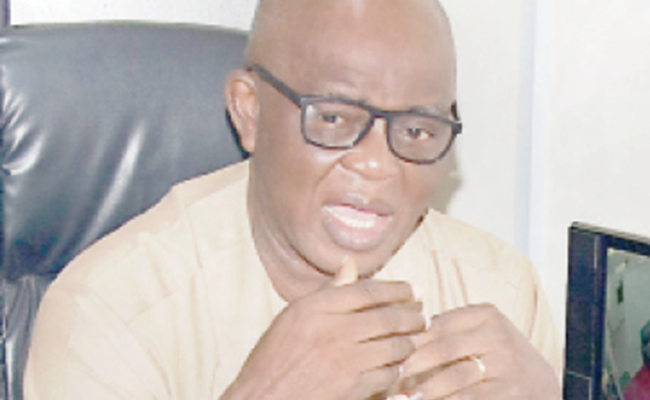Ogun State Commissioner for Environment, Ola Oresanya, spoke with select journalists about what the Dapo Abiodun administration is doing to combat environmental issues in the state, and thereby improve the health and wellbeing of its people. PAUL OMOROGBE shares excerpts:
ON climate change, we’d like to know the Ogun State government’s approach to this issue.

The government’s position is to latch on to the national policy direction when it comes to climate change. And the national policy direction is embedded in the global agreement, popularly called the Paris Agreement, that was endorsed by this government.
That means all our policies should look into reduction in carbon footprint. Ogun State is a sub-national government and a very important component in this agreement. Why are we important? We have the highest number of industries in Nigeria. This is where we have the highest gaseous emissions, outside the oil producing areas.
So, our policy direction is to reduce the emission that will have contributed to climate change. If we have our policy well entrenched, it will reduce the carbon emission, it will reduce the national carbon footprint. It will allow Nigeria to move closer to this target of the nationally determined contributions (NDCs). Our policy is to make sure we contribute our own quota, to make sure that we get there fast before the 2030 target.
How exactly does government want to reduce air pollution?
We’re invoking the polluter pays principle whereby, if you’re polluting, you will pay. So, for those industries who are not abating their emission, we make them pay. So, on our policy, we have the emission standards. We collect data from all industries and if you are not reducing your emission, you will pay for it.
Then, we have the vehicles. We’re the gateway into other parts of Nigeria. We have one of the highest vehicular densities when it comes to intercity transportation, talking about the Lagos-Ibadan Expressway. The vehicular density there is far above 250 vehicles per hour. That is a high vehicular density. So, for this, in Ogun State, there is a vehicular emission fee you pay. So, the polluter pays principle is what we have invoked to make sure that we give a disincentive for emission.
Also, for those who have deployed enough technology to reduce their emission, we reward them annually with the Governor’s Award to encourage them to join the league of those who reduce emissions.
What about mitigation? Our mitigation strategy is to make sure that we plant enough trees.We have one of the biggest forest covers in Nigeria. We are the only state in Nigeria with a Ministry of Forestry. That underscores the importance we give to mitigation and adaptation.
We increase our forest reserves annually by planting trees. We have our tree planting days in first week of August every year, and that way we make sure that we increase the number of trees we plant in the urban and in the rural centres.
We are not just mitigating the industrial and vehicular emission in Ogun States, but for all the contiguous states. You know that air travels, so we are able to provide a sink where we capture carbon. So, by the time you look at the air quality standard in Nigeria, it will keep increasing, because Ogun State is contributing immensely to Nigeria’s forest cover.
Still on air pollution, look at places like Agbara and Ewekoro. One of the challenges in those areas is the air pollution from industries and cement factories and how that affects the health of the people. Residents left farming for other businesses. What are you doing about this?
Well, when you look at the cement industry, all over the world, it is one of the industries with the highest levels when it comes to carbon emission. In Ogun State, we have the highest number of cement industries in Nigeria. Apart from the cement industry, we have the highest non-oil extractive industries in Nigeria. Now, to address the question about the cement industry in particular. Three quarters of Ogun State is underlain by limestone.
Larfarge Cement has two factories here in Sagamu and Ewekoro. We have other industries like BUA and Dangote. Dangote has the biggest factory here at Ibeshe. We have International Cement also in Ogun State.
For the Ewekoro area, what we did was to take what we call the stack records. We got consultants of international repute to give us what is coming up from the stack. What we got in Ewekoro was within permissive limits. Where Ewekoro had a problem was at their mining site.
They were not able to precipitate the dust from their mining site, not from the stack. Where they had a stack problem, that’s at the Sagamu factory, we shut them down.
Up to today, Sagamu factory is not working. We shut it down two years ago. And we told them until they complete the installation of their precipitator, they will not open that factory.
The factory at Ewekoro, they have the scrubber there. They have the precipitator there. The pollution is coming from the mine. We are working with them on that.
But while we did the investigation further, we found out that where those people are farming, the land actually belongs to Lafarge. But because they were not there to mine for years, people started using this land as a farmland. Lafarge said, look, this land belongs to us. But because we are not using it, we allowed farming temporarily. So, we were able to resolve that community issue.
What happened at Ibeshe is worse than what is going on at Ewekoro. But we were able to intervene there. I was there. Minister of Environment. And we told Dangote to what to do to avoid any kind of backslide.
We support the cement industry in their decarbonisation programme. So we are decarbonizing them by using refuse. We turn refuse to what we call the refuse-derived fuel. They are going to use it as a main component of their energy transition programme to reduce the fossil fuel they are using in their plants. We are working with McKenzie, which is a global organisation on this. We are working with Manufacture Africa which is a British government-owned SPV. We are using refuse, not just from Ogun State alone, but from other contiguous states. We are working seriously in that direction and we are pitching this at COP29, which is the Climate Change Summit coming up in Azerbaijan.
At the border towns with Lagos, there’s something that happens along the Lagos-Ibadan Expressway which is open defecation. It’s a serious issue. We want to know how your ministry is handling that issue.
We’re talking about open defecation. Several things could make people indulge in that. Lack of infrastructure for toilets. Social values: you find some people even with the toilet beside them, they still prefer to go do their thing out there. Or lack of consequences for that kind of misbehaviour. So, whatever we’re doing, we’re conscious of what could have warranted that. For Kara, the particular area where you talked about, it’s not just lack of infrastructure. It’s all about social values because most of the people have been displaced. Inside Kara, you have public toilets. But rather than go there, they will still want to indulge in open air defecation where they will smoke also. They get kind of a relief from doing their thing openly and smoke whatever weed they want to smoke. And they’ll tell you that’s the way they enjoy their life. So, for some people, it’s a psychological issue.
To change the habit, we have to have a kind of a reprimand. And that’s exactly what we’re doing. I was there two days ago. You don’t see what you used to see there. It has reduced, seriously. We now have people policing the area 24/7. When you’re caught doing it, you go through the experience of community service of cleaning the area. And that probably is a deterrent right now.
What about infrastructures? We’ve populated the area with another six new public toilets. From Berger towards the Nigerian Tribune Office there, you will count six public toilets with the yellow roofs, just constructed right and left.
The next thing we are putting out is signages around the area, so that at least they will see warnings. We will criminalise open defecation. So, it’s not just community service right now. Some of them may have to go and serve a jail term somewhere. We are doing so much to make sure we eradicate it in that area.
Where have the cases of open defecation habits in Ogun State it is localised in areas where you have people who are not indigenous. We have a place in Abeokuta. The people there are non-indigenous. So, I don’t know if any kind of social habits are imported in this area. But we will not allow the degradation of our environment with such obnoxious actions.
WASH strategy in Ogun State
One of the good news you must hear is our strategy of implementing what we call the WASH, that is, Water Sanitation and Hygiene Programme. We have the first local government in that Southwest that was declared open defecation free. That is Ikenne local government. What we did there was to follow the UNICEF protocol, to make sure that every household has a functional convenience. And we achieved that.
We are scaling that up in the state, making sure that we have more public toilets all over the state so that you don’t have any reason to openly defecate.
Our public toilets in Ogun State are unique. It’s unique in the sense that the faeces, the sewage, is used in what we call the bio-reactor. We use it to generate electricity in those toilets.
We’re tightening our laws to make sure that all restaurants, petrol stations in Ogun State, if they don’t make their toilets available for people to use, we can seal the place up.
We’re going to make sure that people have numbers to call, so that if you are pressed, and you approach a petrol station to use a toilet, and they deny you. Because one of the conditions for giving them the license to operate is that they must have a functional toilet for public use – not just their customers! So you don’t have any reason whatsoever to do anything on the road. I can assure you that our target is that before June next year, additional 10 local government in Ogun State will be ODF.
Read Also: Navy commissions Niger primary school







